Hundreds Of Thousands In Hong Kong Protest Proposed Changes To Extradition Law
Protesters flooded the streets of Hong Kong on Sunday over proposed change to the city's extradition laws.
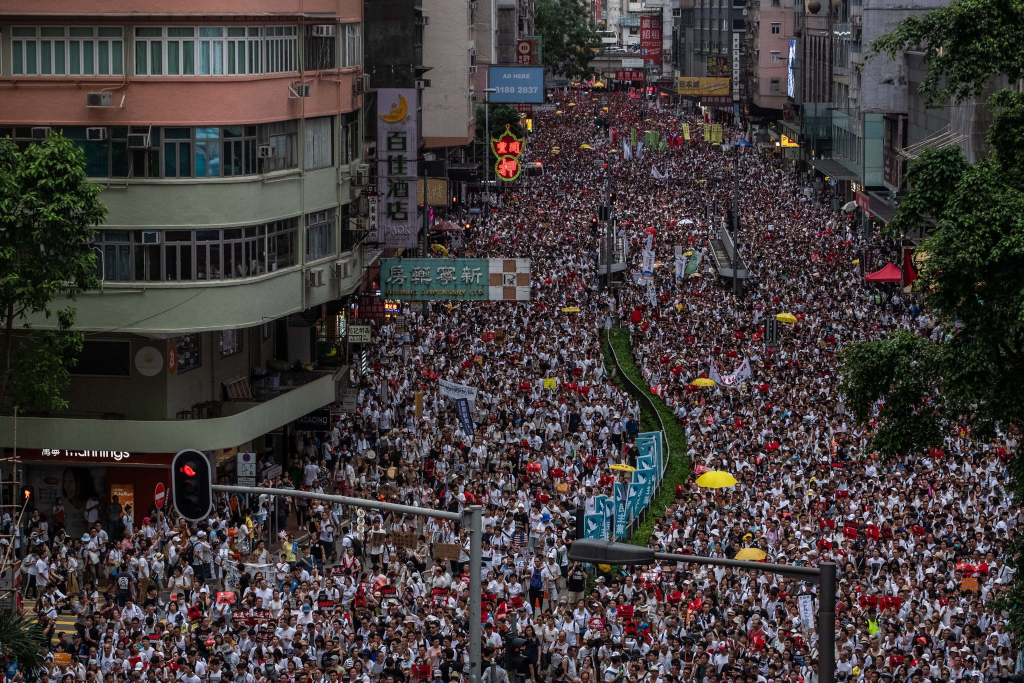
Hundreds of Thousands, if not a million or more, of Hong Kong residents took to the streets today to protest a change in extradition laws in the former British territory that would make it easier for authorities to extradite those who are arrested and charged with a crime to mainland China:
HONG KONG — Hundreds of thousands marched Sunday through the sweltering streets of Hong Kong against a government proposal that would allow extraditions to mainland China. Organizers said it was the largest protest against Beijing’s tightening grip on the former British colony since its return to Chinese rule more than two decades ago.
The mass demonstration — organizers said they counted more than one million participants, or nearly one in seven Hong Kong residents — was a dramatic rebuke of Carrie Lam, the city’s chief executive, and immediately raised the stakes in her contentious push to adopt the new legislation, which the ruling Communist Party in Beijing has endorsed.
As midnight approached, the streets around the central government’s offices were packed with thousands of people waving signs saying “No China Extradition” and “No Evil Law,” reminiscent of the pro-democracy rallies five years ago that paralyzed several of the city’s main commercial and government districts and captivated the world.
Sunday’s demonstration was largely peaceful, though tempers flared near the government offices as the protesters, whose march had slowed to a standstill in some parts, urged the police to free up more lanes for them to proceed. Crowds booed when police buses, with lights flashing, arrived. Police officers used pepper spray on a handful of protesters at one point.
The protesters had set off from Victoria Park in the afternoon, with temperatures in the mid-80s and scattered rains providing little relief from the humidity. Many wore white as a symbol of justice and also mourning in Chinese culture.
The police estimated there were 240,000 protesters at the peak of the protest, but organizers, giving a figure topping a million, called it the biggest rally since 1989. As the crowd poured through the canyons of skyscrapers, it seemed to surpass the 2014 pro-democracy rally that drew more than half a million people.
The organizers of Sunday’s march said they hoped the numbers would show the breadth of disagreement with the extradition plan, which has stirred worries that people in Hong Kong, including foreign visitors, would be sent to face trial in Communist Party-controlled courts in mainland China.
The protesters directed much of their opposition toward Ms. Lam, the chief executive, calling for her to step down and booing as they passed a large screen displaying footage of her at a news conference. Ms. Lam declined to answer questions about the protests on Sunday, but the huge public outcry puts her in a difficult spot ahead of a vote on the bill expected later this month.
Late Sunday the government, responding to the protests, issued a statement saying the bill would prevent Hong Kong from becoming a haven for fugitives, and pledging to “continue to engage, listen and allay concerns through calm and rational discussion.”
The turnout underscored the deepening anxiety that many residents feel over Beijing’s tightening grip over Hong Kong, a semiautonomous territory. The Communist Party had promised a “high degree of autonomy” before Britain returned the territory to Chinese sovereignty in 1997, but many feel that the city’s freedoms are steadily eroding under Beijing’s rule.
“I think this law will take away our freedoms if it is implemented,” said Peter Lam, a 16-year-old high school student. “We will not have the right to express ourselves. So we must stand up and express ourselves today.”
Young people and families were prominent in the crowd, with parents bouncing toddlers on their hips and leading young children by the hand. One child clutched a sign saying, “Protect my future.”
The protesters’ numbers were so large that many protesters said they were still stuck in subway stations waiting to join, and some trains were skipping stations because of overcrowding.
The police said that officers used pepper spray after five or six masked men tried to occupy a major thoroughfare near the route of the march.
The proposed legislation would allow for suspects in some criminal cases to be turned over to jurisdictions with which Hong Kong has no formal extradition agreement. The immediate goal is to enable the government to send a Hong Kong man to Taiwan, where he is accused of having killed his girlfriend.
But there is deep concern about the broader implications of the legislation, particularly enabling extraditions to mainland China.
Hong Kong’s courts are far more transparent and independent than those in the mainland, where President Xi Jinping has been intensifying a crackdown on civil society. Worries about the reach of mainland China’s legal system have been made worse by the disappearance of people from Hong Kong into mainland custody, including a Chinese billionaire and men associated with a company that published books unflattering to mainland political leaders.
“Their judicial system is not good,” George Wan, 31, a freelance tour guide and writer at the protest, said of mainland China. He said the Hong Kong government was rushing the legislation through without properly consulting the public.
“We want to use our footsteps to tell the government we want more time,” Mr. Wan said as he waved a folding fan painted with characters that read “Oppose sending to China.”
This proposed law has apparently been brewing for months now with journalists who could potentially become targets due to their coverage of issues from the mainland and from civilians fearful of being handed over to mainland authorities. Additionally, the protest comes as a particularly sensitive time in Hong Kong. It was just a few days ago that similarly sized crowds turned out to mark the 30th anniversary of the Chinese government’s massacre of civilians in Tiananmen Square after more than a month of student-led protests. That anniversary went unacknowledged in China itself, both in Beijing and elsewhere, although there may have been quiet remembrances in private around the country. As a result, passions seem to be particularly high right now among the civilian population in Hong Kong, which remains largely autonomous in its legal system and other ways despite the fact that it has been back under Chinese jurisdiction for the past 32 years.
The last time Hong Kong saw protests this big was some five years ago in response to proposed political reforms that would have limited the right of residents to speak out freely as guaranteed by the treaty China signed in 1997. In that case, the protests fizzled out after reaching a peak nearly as big as what we’re seeing now, but they effectively succeeded in that the legal changes were either scaled back or canceled altogether. What both instances, as well as the annual protests that mark the anniversary of the Tiananmen massacre, is that the people of Hong Kong still jealously guard the rights that they have under the law and that any perceived efforts to limit those rights would be met with protest. Certainly, China could respond to all of this by cracking down in the rebellious city but the leadership is wise enough to know that doing so would be a disaster both in terms of the widespread coverage it would receive from the western media, which is well-established in the city, and internationally. Even in this era where prosperity is becoming more widespread in China a whole, Hong Kong remains the goose that laid the golden egg and the leadership in Beijing is obviously too smart to mess that up.

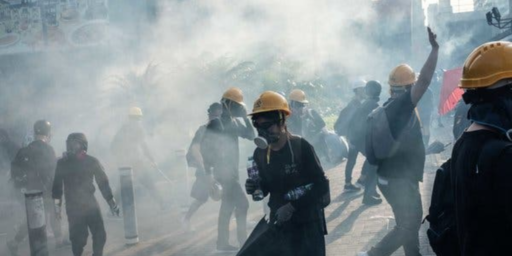
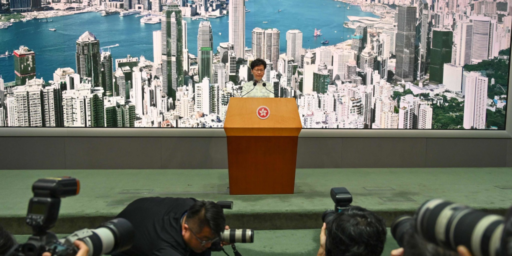
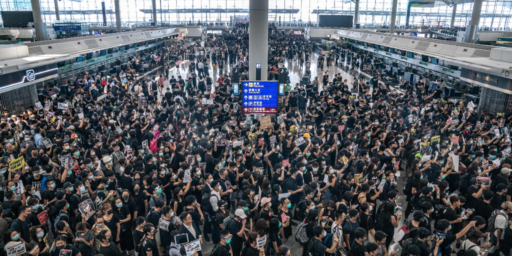
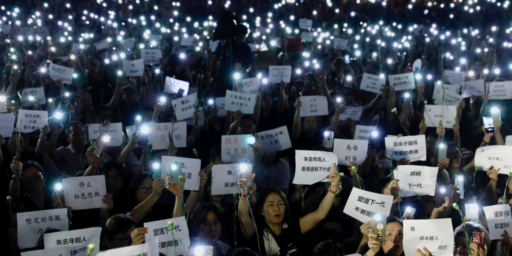
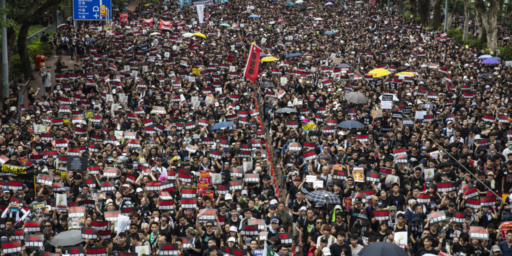
I’m puzzled. Does the regime in Beijing extradite people to Taiwan? I thought that they didn’t have formal relations.
How are things in Hong Kong in general? Is school taught in Mandarin or the HK version of Cantonese?
I had a conversation with a Hong Kong native at the time when the PRC took over. He said that he wasn’t worried. The rich people had secured their assets overseas, and the ultimate government authority makes little difference to the poor. He had a grandchild born in the US, one in Canada, and one in Australia, BTW.
No, the Chinese government just delayed the changes and arrested the protest leaders to prevent further protests when the same changes were brought back a year later.
Hong Kong’s fate was sealed in 1997 when the UK abandoned 6 million of its own citizens for the crime of not being white. The only question since then is how quickly China would break its promises.
@Stormy Dragon:
That’s a strange characterization of living up to a treaty obligation. I was rooting for them to find an excuse to not follow through but there really was no option.
@Stormy Dragon: It’s maybe worse than that. There was a proposal at the time to permit Hong Kong residents to relocate to the British Isles–Northern Ireland specifically. The goal appears to have been to drive the Irish out, thus ending “The Troubles.”
@Just nutha ignint cracker: Here’s the link and the money quote:
@James Joyner:
1. Does a Treaty signed between the UK and Qing China place any obligations with regard to the PRC? Especially when the PRC is the responsible for destroying the actual signatory? Why is PRC considered the successor government and not RoC? If the handover was already covered by existing treaty obligations, why was a new treaty necessary in 1984?
2. Even if we decide PRC has a right to the land, that doesn’t translate into a right to the people living there. The UK spent the two decades leading up to the handover stripping overseas British Nationals of more and more citizenship rights, only to give all the remaining overseas territories back full citizenship in 2002. It’s hard to see this as anything other than a deliberate abandonment of the people in Hong Kong.
Compare how the UK handled the Falkland Islands vs. Taiwan: within a year of Argentina trying to take the Falklands, the UK made every single person living there full citizens of the UK and launched a war to reclaim the islands.
The difference? The British Nationals living on the Falklands were largely white.
@Stormy Dragon: P.J. O’Rourke suggested air dropping five million green cards on Hong Kong at the time. His argument was that they were hard-working, industrious, with an ancient culture, and a great cuisine. Of course that argument could be made for lots of people. I do like the HK way with seafood.
@Stormy Dragon: I think you are being unduly cynical (I know, that’s rich coming from me). Hong Kong was (is?) THE banker to Asia, at a time when Asia was on rocket ride of economic growth. If Britain could have thought of a way to keep Hong Kong they would have done so. But look at a map. Hong Kong is surrounded by the PRC, a nuclear armed nation. Short of a threat of atomic exchange with China there was no way Britain could hold, and there was no guarantee whatsoever that China would have backed down.
We in the West tend to think of Democracy with almost religious zeal, but what democracy really represents is a way for the new guys to take power without a) a bloodbath, and b) with enough of the old guys quasi-surviving to prevent them from changing the rules. Ten years ago it might be argued that China was on a path to something like “Democracy with Chinese Characteristics” but Xi has tossed that aside. He has bet everything on technology. Ten years ago I think most of the Chinese leadership who understood the Internet thought it had to be accommodated, that the Party could no longer serve as the sole source of information and history. But Xi has gambled that technology will allow exactly that. And that facial recognition and the social merit system will allow a reign of a thousand years. I don’t know which I dread more for my Chinese friends: that he is right and they will live a kind of twilight life with friends and family regularly disappeared, or he is wrong and the future will bring a new Tiananmen Square every few months…
@MarkedMan:
The limiting factor is what it always have been: what the rest of the world will allow them to get away with. When Tinamen passed and China was still allowed to host the olympics, join the WTO, etc. they realized they can pretty much do anything and the rest of the world will look away as long as trade keeps flowing. Even now, China is basically starting up a genocide of Uyghur Muslims (with full on Holocaust-style concentration camps) and the rest of the world does nothing.
The weird thing is the one thing the Trump administration has done that I think will benefit the US long terms is starting the trade war with China, even if they backed into it for the wrong reasons, and that we should be easing trade to other countries to compensate.
@Stormy Dragon: The people in Hong Kong are free to leave. Even to travel to mainland China although Chinese need a visa to visit Hong Kong.
And after controlling Hong Kong for over a century without a single election suddenly the UK decided to hold elections just months before the handover.
It’s a complex situation. But we’re 20 years into it. And at 50 years into it all agreed restrictions on China regarding Hong Kong go out the door.
Sorry, I didn’t realize you’d given up on being rational. Beijing knows they only need to ride out Trump and that they are in a much better position to do so than the US.
You really believe in the art of the deal? That’s hilarious!
@MarkedMan: While still a banking powerhouse, Hong Kong is much less important in this regard than it used to be. HSBC not withstanding.
@Davebo:
How does “Trump accidentally backed into a good idea for the wrong reasons” equate to “I believe The Art of the Deal”?
@Davebo: Singapore rising…
@Stormy Dragon: Alternative explanation — there are oil or fishing resources off the coast of the Falklands (there’s one of them… I can’t remember which), and Argentina is a pushover compared to China.
They went to war with Argentina, and lost a ship. In a war with China, they would probably lose several ships.
@Stormy Dragon: Also, the Brits wanted the wealthy people who live in Hong Kong, but not the rest of them. They created hurdles to prevent the poor huddled masses showing up at their door, but I have no doubt they found a way to keep the wealthy few in the fold.
Britain never owned Hong Kong. They leased it from China for 99 years in 1898 under the Convention between the United Kingdom and China, Respecting an Extension of Hong Kong Territory. When the lease ended, international law required Britain return the territory to China.
@Slugger:
Cantonese. And I think there are some English schools, too. All the street signs are in both languages (as you may know, Chinese writing is the same regardless of Cantonese vs Mandarin or any other dialect).
@Franklin:
That may be true, but FWIW Hong Kong uses Traditional Chinese characters (as does Macau and Taiwan) while the mainland uses Simplified Chinese characters. There is quite a difference between the sets.
I don’t buy this. Ten years ago, power was being “shared” to the extent that no one had yet risen to the levels of power previously held by Chairman Mao and so they had to have a rotation, but at the ground level of the populace there was no more democracy or accompanying freedoms than there had been before.
The big breakthrough that the heirs to Mao happened upon was the discovery that they could be quasi market capitalists and still maintain authoritarian government. The big mistake of the West was seeing market economics emerging and deciding democracy has arrived in China. Democracy and market capitalism have only been linked in our times through happenstance. Governments are only and always as good as the people living in them and the leaders who arise. Same with the philosophies that guide those governments. It’s why Aristotle distinguished between monarchy and despotism, aristocracy and oligarchy, and polity and democracy (democracy was the dysfunctional one of that pair, remember).
@Just nutha ignint cracker: China became immeasurably more free after Mao. That doesn’t mean it is a free country, and it certainly doesn’t mean it is democratic, but still, the difference is night and day. Up until 2012 or 2013 it was moving in the same direction as Singapore. But the four years I lived in Shanghai, 2011-2015 turned out to be a turning point. Up until I arrived the country was increasingly getting connected to the outside world, and to a large extent it still is. Tens of millions of Chinese travel abroad every year and China’s best and brightest often get at least some of their education in Western democracies. But while I was there, the tides started turning. That first year I could go anywhere on the internet at reasonable speeds with a cheap VPN, except during sensitive holidays and I lived in the heart of a Chinese neighborhood, not in an expat community. By the time I left I had three VPNs and was constantly switching between them trying to find something that could get me through. (Interestingly, my work connection never was blocked). And the average person was pretty free to speak against the government and rail against corruption, as long as they didn’t develop a following. Now, not so much. One of the biggest things that worked in favor of the people was that a regional or city administrator could have their career ended overnight if they were perceived as causing a breach of social harmony. So despite being able to call in troops or massive amounts of police to put down a protest, it was considered better to placate the workers/students/mothers so that it wouldn’t get that far, lest the Party decide that regional leaders was too much of a liability. With a consolidation of power however, I fear that restraint may be disappearing.